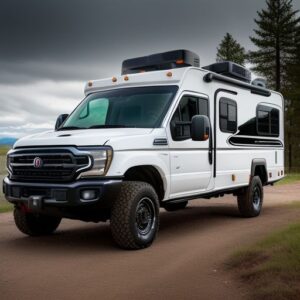Will an RV make a good bug out vehicle? – The Ultimate Survival Guide
In a world where preparedness is paramount, the question arises: could an RV serve as the perfect bug out vehicle?
Imagine the ability to carry all your survival gear, food, water, and shelter in a mobile unit that’s ready to go at a moment’s notice. An RV, with its spacious interior and on-the-go living accommodations, seems like an ideal choice.
But is it really the best option for when disaster strikes? Let’s dive into the world of survival vehicles, exploring the pros and cons of using an RV as your bug out vehicle. You’re about to embark on a journey of discovery, equipping you with the knowledge you need to make an informed decision. Buckle up, it’s time to hit the road into the world of survival preparedness.
“Is an RV suitable for a bug out vehicle?”

When considering a bug out vehicle, an RV might not be the first option that comes to mind. However, an RV has several unique features that could make it an excellent choice. Firstly, it provides ample space for storing essential supplies. This space is crucial when planning for a bug out scenario where you might need to carry food, water, medical supplies, and other survival gear.
Secondly, an RV offers comfortable living quarters, which can be a significant advantage in a bug out situation. Having a place to sleep, cook, and even shower can make a huge difference in your survival and comfort levels.
Another factor to consider is the RV’s mobility. While it’s true that an RV may not be as fast or maneuverable as a smaller vehicle, it’s capable of covering long distances. This can be particularly useful if you need to travel far from a disaster area.
However, there are also some drawbacks to using an RV as a bug out vehicle. For example, they can be expensive to maintain and fuel. They are also not as stealthy, which might be a consideration if you’re trying to avoid drawing attention.
In conclusion, an RV can indeed serve as a viable bug out vehicle, but it’s important to weigh the pros and cons before making a decision.
“What features make a good bug out vehicle?”
When considering a bug out vehicle, an RV can be an excellent choice due to its capacity, comfort, and self-sufficiency. The main advantage of an RV is its spaciousness, allowing for the storage of essential survival gear, food, water, and personal belongings. This is crucial for long-term survival in a bug out situation.
Furthermore, the comfort factor cannot be overlooked. Unlike smaller vehicles, an RV provides ample living space, including sleeping areas, kitchenette, and bathroom facilities. Such amenities can significantly improve the quality of life during a stressful situation, making it easier to maintain morale and mental health.
Another key feature of an RV as a bug out vehicle is its self-sufficiency. Many RVs come equipped with solar panels, generators, and water purification systems, allowing you to stay off-grid for extended periods.
However, there are some drawbacks to consider. RVs are not as agile or fast as smaller vehicles, and they consume more fuel. Also, their size can make them more conspicuous, which might not be ideal in certain scenarios.
Lastly, it’s important to consider the terrain and climate where you plan to bug out. An RV might not be the best choice for rough terrains or extreme weather conditions.
In summary, while an RV might not be the perfect bug out vehicle for every situation, its capacity, comfort, and self-sufficiency make it a strong contender for many scenarios.
“Can an RV store enough supplies for survival?”
When considering whether an RV can serve as a viable bug out vehicle, one of the main factors to consider is storage capacity. An RV is designed with ample storage compartments, both inside and out. These compartments can be utilized to store a variety of survival supplies, such as food, water, medical supplies, and tools.
In terms of food storage, an RV typically has a built-in refrigerator and pantry. This allows for both perishable and non-perishable food items to be stored. Moreover, additional food can be packed into portable coolers and storage bins, further increasing the RV’s food storage capacity.
- Water storage is another critical factor for survival. Most RVs have built-in freshwater tanks that can hold anywhere from 20 to 100 gallons of water. Additionally, portable water containers can be filled and stored, providing an additional water source.
The RV’s storage capacity extends to medical supplies as well. First aid kits, medications, and other necessary medical supplies can be easily stored in the RV’s cabinets and compartments. Tools and other survival gear can be stored in the RV’s exterior compartments, keeping them easily accessible yet out of the way.
While storage capacity is a significant advantage of using an RV as a bug out vehicle, it’s also important to consider other factors such as fuel efficiency, maneuverability, and maintenance requirements. Ultimately, the suitability of an RV as a bug out vehicle will depend on individual needs and circumstances.
“How is an RV’s off-road capability for bug out?”
An RV, or Recreational Vehicle, is a popular choice among preppers for a bug out vehicle. Its off-road capability, however, depends on several factors. Firstly, the type of RV matters. A Class A motorhome, for instance, is typically not designed for off-road conditions. On the other hand, Class B and C RVs, especially those with 4×4 drive, can handle off-road terrain better.
The RV’s ground clearance also plays a crucial role in its off-road capability. Higher ground clearance allows the vehicle to navigate over rocks, logs, and other obstacles without damaging the undercarriage. Additionally, the weight and size of the RV can affect its maneuverability on off-road trails. Larger and heavier RVs may find it difficult to navigate narrow paths and steep inclines.
Off-road tires can significantly enhance an RV’s off-road performance. These tires are designed to provide better traction on loose or uneven surfaces. Some RV owners also opt for aftermarket modifications like skid plates and lift kits to improve their vehicle’s off-road prowess.
However, it’s worth noting that while an RV can be modified for off-road use, it’s not its primary purpose. The living quarters and amenities that make an RV a comfortable bug out vehicle may not withstand the rigors of off-road travel. Therefore, it’s vital to balance the need for comfort and livability with off-road capability when choosing an RV as a bug out vehicle.
Remember, the best bug out vehicle is the one that suits your specific needs and circumstances. So, consider all aspects, including off-road capability, before settling on an RV for your bug out plan.
“Does an RV offer enough space for a family?”
When evaluating an RV as a potential bug out vehicle, the question of space is paramount. An RV, with its multiple compartments and well-designed layout, can indeed provide ample space for a family. The living quarters in an RV are typically equipped with essential amenities such as a kitchen, bathroom, and sleeping areas. This makes it a suitable choice for families seeking comfort and convenience during a bug out situation.
In addition to living space, an RV also offers storage space for essential items. This includes areas for food supplies, water reserves, medical kits, and other survival gear. The presence of these storage compartments can significantly ease the stress of packing and transporting necessary items during a bug out situation.
• The RV’s flexibility is another factor that contributes to its suitability as a bug out vehicle. It can be easily adapted to accommodate a family’s changing needs, with the potential to add or remove furniture, upgrade appliances, or even modify the layout.
However, it’s essential to consider the size of your family and your specific needs when choosing an RV. Larger families may require an RV with more sleeping areas, while smaller families or couples may find a compact RV more manageable and fuel-efficient. Regardless of the size, an RV’s well-thought-out design can make it a viable option as a bug out vehicle.
Remember, an RV’s space isn’t just about physical dimensions. It’s also about the ability to carry your family and supplies safely and comfortably in a bug out situation.
“What are the fuel efficiency considerations of an RV?”
When considering an RV as a bug out vehicle, fuel efficiency is a vital factor to consider. RVs, by nature, are not typically known for their fuel economy. The size and weight of these vehicles can lead to a higher fuel consumption rate, especially in situations where you may need to travel long distances in a hurry.
However, this is not to say that all RVs are gas guzzlers. There are compact RV models available that offer better mileage than their larger counterparts. Additionally, diesel-powered RVs tend to be more fuel-efficient than those running on gasoline. The type of terrain and driving habits can also significantly impact the fuel efficiency of an RV.
• Regular maintenance can improve fuel efficiency. This includes timely oil changes, tire pressure checks, and ensuring your RV is not carrying unnecessary weight.
While an RV might not be the most fuel-efficient option for a bug out vehicle, its other benefits such as living space, storage capacity, and off-grid capabilities may outweigh this drawback for some. It’s all about balancing your specific needs and circumstances against the potential trade-offs.
Remember, the key to using an RV as a bug out vehicle effectively is planning and preparation. Knowing your vehicle’s fuel consumption rate and planning your route accordingly can help mitigate the impact of lower fuel efficiency.
“How secure is an RV during a disaster situation?”
When considering a bug out vehicle, an RV might not be the first option that comes to mind. However, RVs can provide significant advantages during a disaster scenario. For one, they offer mobility, allowing you to relocate quickly and efficiently, which is crucial when you need to escape from a dangerous situation.
In addition to mobility, an RV provides a comfortable living space. It is essentially a mobile home, equipped with essential facilities such as a kitchen, bathroom, and sleeping quarters. This can be invaluable in a disaster situation when access to basic amenities might be restricted or non-existent.
Another benefit of an RV is its storage capacity. You can store a substantial amount of supplies, including food, water, and medical kits. This can sustain you and your family for an extended period, especially when resources are scarce.
However, it’s important to note that an RV’s security during a disaster situation largely depends on its condition and your preparedness. Regular maintenance is key to ensure that your RV is always ready to hit the road. Also, you need to plan your route and have a backup plan in case of unforeseen circumstances.
While an RV can offer certain advantages as a bug out vehicle, it does come with its own set of challenges. For instance, its size and fuel consumption can pose problems, especially in a situation where fuel might be scarce or roads are blocked.
In summary, an RV can be a good bug out vehicle, but its effectiveness will largely depend on your preparedness and adaptability during a disaster situation.
“Can an RV be camouflaged for stealth in bug out situations?”
When considering a bug out vehicle, an RV offers several advantages. Its spacious interior can accommodate your family and essential survival gear. However, one might wonder if an RV can be camouflaged for stealth in bug out situations?
Camouflage is indeed possible with an RV. The key lies in choosing the right color and patterns that blend with the environment. For instance, earth tones like green, brown, and black are ideal for forested areas. You can also add brush or netting to break up the vehicle’s outline.
Another aspect to consider is the RV’s size. While larger RVs provide more living space, they can be more challenging to conceal. Opting for a smaller, compact RV can make your bug out vehicle less noticeable.
The RV’s noise level is another factor to consider. Diesel engines, for instance, can be quite loud and attract unwanted attention. Therefore, maintaining your RV’s engine and exhaust system is crucial to minimize noise.
- Use earth tone colors for camouflage
- Choose a compact RV for easier concealment
- Maintain the engine and exhaust system to reduce noise
In addition to physical stealth, consider electronic stealth. Avoid using devices that emit strong electromagnetic signals, as these can be detected by advanced equipment.
Stealth camping, or boondocking, is another strategy to consider. This involves camping in remote locations where you’re less likely to be spotted.
In conclusion, while an RV may not be the first choice for a stealthy bug out vehicle, with proper camouflage and stealth strategies, it can serve as a viable option. Remember, the key is to blend with your surroundings and minimize attention.
Concluding Thoughts on RVs as Bug Out Vehicles
In conclusion, an RV can indeed make a suitable bug out vehicle, given its capacity to store ample survival supplies and accommodate a family comfortably. Its off-road capabilities, while not on par with specialized off-road vehicles, are generally adequate for most bug out scenarios. However, considerations such as fuel efficiency and security during disaster situations are crucial. While an RV’s size might pose a challenge in terms of fuel consumption, strategic planning and efficient use of resources can help mitigate this issue.
In terms of security, an RV offers a decent level of protection, but additional measures may be necessary depending on the nature of the disaster. Stealth and camouflage, while not inherent to most RVs, can be enhanced with some modifications and strategic planning.
As we move forward, advancements in RV design and technology may further increase their viability as bug out vehicles. For instance, improvements in fuel efficiency and the rise of electric RVs could address some of the current challenges. Therefore, it is essential to stay informed about these trends when considering an RV as a bug out vehicle.
Ultimately, the decision rests on individual needs and circumstances. It’s crucial to assess your specific situation and make an informed decision based on the factors discussed.



